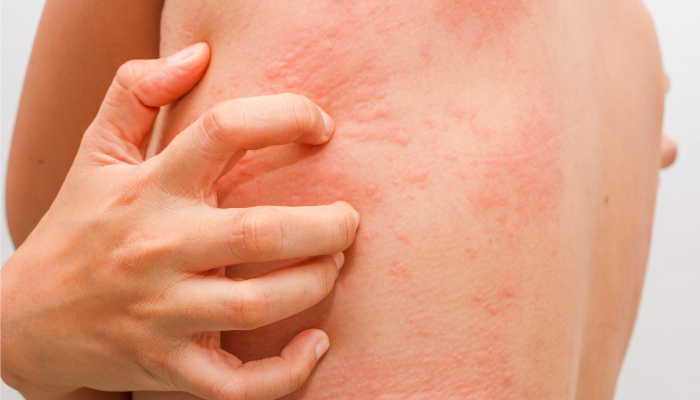Chronic Spontaneous Urticaria (CSU)
CSU is the medical term for chronic hives that have no known cause. It can look and feel different for everyone, but all cases of CSU result in itchy hives that last for six weeks or longer. This can result in raised red bumps that may grow, spread, change, disappear and reappear on the skin. Unlike other types of hives, there is no known cause of CSU. This makes it harder to diagnose and treat than other conditions, and it may take some time before you are diagnosed. If you think you might have CSU, speak with an allergist, who is trained to identify and diagnose the cause of hives.
CSU is not caused by allergies or an infection, and it is usually not life threatening. It also is not contagious and it is not caused by a reaction to the sun, stress, hormones, foods or other medical conditions. While some people may identify things that make their CSU seemingly worse, what distinguishes CSU from other forms of hives is that there is no known cause.
People who have chronic hives often think the hives are caused by something they’ve done or interacted with. Many people will go through an “elimination diet,” meaning they take foods out of their diet and slowly add them back to see if they have a reaction. They may also try to change products like soaps and detergents. For people with CSU, these things won’t make their hives go away.
Idiopathic Angioedema
History of intermittent swelling episodes with an unknown trigger could be a sign that you are suffering from chronic idiopathic angioedema (CIA). CIA may be associated with hives but does not have to be. Common triggers include heat, cold, and viral infections. CIA is more common in females with an average age of onset between 30-50 years. Plasma and tissue factors, such as bradykinin, have been associated with angioedema.
Hereditary Angioedema (HAE)
Hereditary Angioedema (HAE) is a very rare and potentially life-threatening genetic condition that occurs in about 1 in 10,000 to 1 in 50,000 people. HAE symptoms include edema (swelling) in various parts of the body, including: hands, feet, face and airway (throat). Patients often suffer excruciating abdominal pain, nausea, and vomiting caused by swelling in the intestinal wall. Swelling of the airway or throat is particularly dangerous, because it can cause death by choking. It is common for HAE patients to remain undiagnosed for many years. HAE symptoms are not the same for every person, even within the same family. Therefore, patients must partner with an HAE treating specialist, like those at Bernstein Allergy Group, to create an individualized treatment plan that leads to a healthy life.
Acquired Angioedema
Acquired Angioedema (AAE) is a rare disorder that causes recurrent episodes of swelling (edema) of the face or body, lasting several days. People with AAE may have swelling of the face, lips, tongue, limbs, or genitals.

